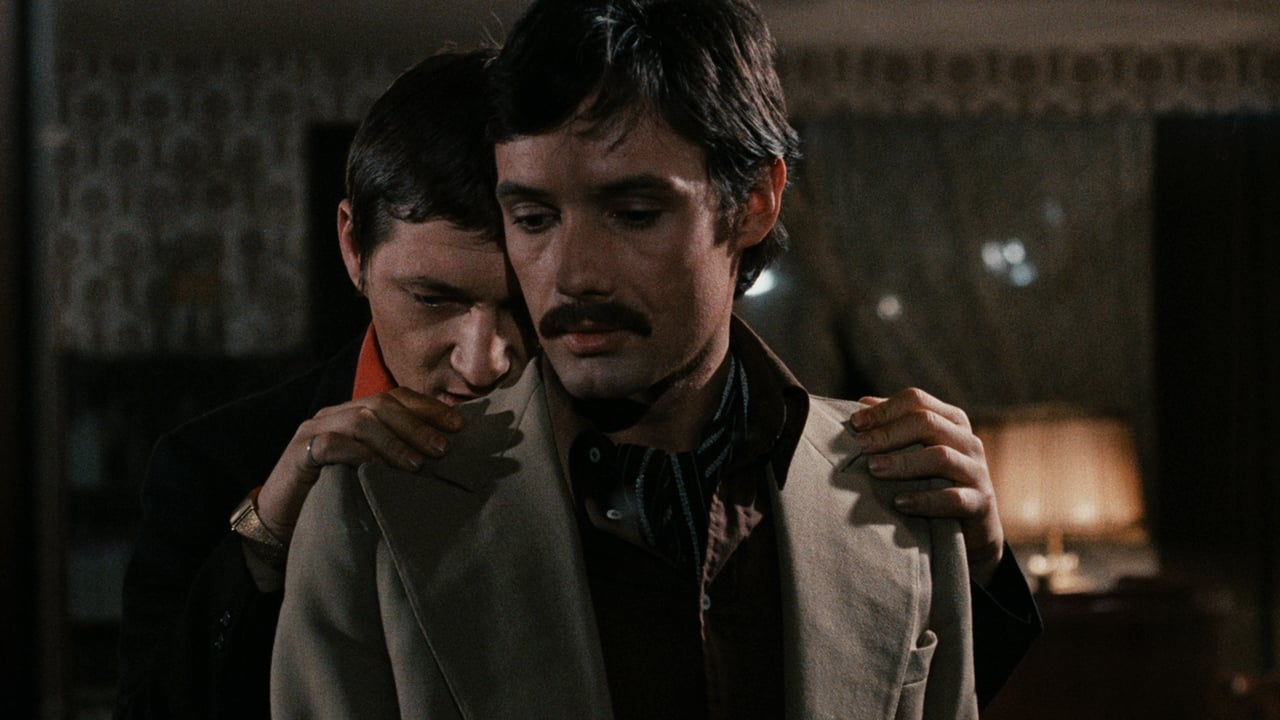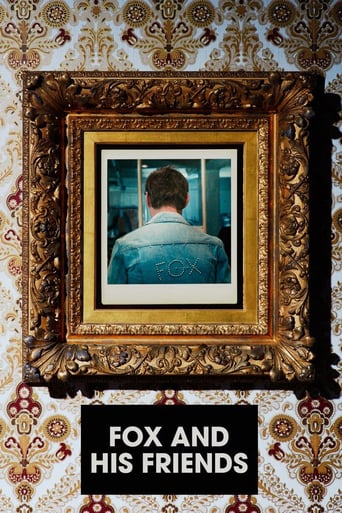ReaderKenka
Let's be realistic.
GarnettTeenage
The film was still a fun one that will make you laugh and have you leaving the theater feeling like you just stole something valuable and got away with it.
Kamila Bell
This is a coming of age storyline that you've seen in one form or another for decades. It takes a truly unique voice to make yet another one worth watching.
Phillipa
Strong acting helps the film overcome an uncertain premise and create characters that hold our attention absolutely.
Joe H.
Before watching any Fassbinder movie, one should be aware of the fact that this is an artist who used to direct up to six feature films a year. And in Fox And His Friends, boy does it show, everywhere and all the time and in the director's trademark superb low-key f**k you fashion. Does it matter that much to you? If it does, then you might not be watching this film for the right reasons.A year before Fox, the combo writer-director-cinematographer-editor-actor Rainer Werner Fassbinder portrayed the mishaps of a forbidden and most non-glamorous love affair between an old cleaning lady and a young – Arab – homosexual in the dangerously gorgeous film Ali. In Fox, RW Fassbinder stars himself as a young, big-mouthed, bad-mannered and proud-to-be gay man (that looks exactly like a hybrid between the middle boy in the Von Trapp family and Tintin) and chronicles his endeavors as he falls in love with a guy out of stupidity while the latter falls in love with him for his newfound money. Everything you don't want to mix in a feature film. Yet it works.You don't "have fun" while watching Fox And His Friends, but you don't struggle that much through it either (at least not the way some people would struggle through, say, Querelle, or a middle-age Goddard). Pace does plunge from time to time but it ends up being an irrelevant issue. Fassbinder knows very well that the audience measures its excitement and boredom on a Hollywood-established scale and he makes it perfectly clear that he doesn't care. He's not trying to annoy you. He's too busy voicing issues that would never get a chance in a corporate-funded film, so he simply couldn't care less.And speaking of corporate, it feels very satisfying to watch Fassbinder unfold his utter disgust of corporations, as you sit through the perfect recipe of a Hollywood suicide: lighting is terrible, editing is all over the place, nobody was paid to record live sound and don't get me started on dubbing, the narrative proves that the author trimmed holes in his script like squares in a backyard, 95% of the characters are gay, lovers, or gay lovers, the director/main actor walks around naked in half of the film while he congratulates himself on having very questionable hygiene, actors never bother to deliver more than one dimension, the cinematographer sticks to the classic 4/3 academic ratio in a generation where ultra-widescreen formats rule and the film finally performs Hara Kiri in the most non-pretty non-happy ending ever.A rather intriguing aspect of watching Fox And His Friends in the 21st Century is that it triggers AIDS-related goose bumps as the eponymous character is tested for a mysterious illness, despite the film being released years before the AIDS epidemic broke in the West. When Fox was produced in 1975, AIDS didn't even exist as an unidentified enemy, but homosexuality was a very degrading thing to be, and perhaps this film acts as a voice to this unspoken terror. There wasn't AIDS yet, but there was sexual terrorism. Fox even goes beyond sexual fear and labels and encapsulates the problematic of social identification altogether (the working-class sister who's afraid to confront the world of socialites because of her manners and her drinking problem, the lover who judges Fox's intelligence based on his musical tastes and, later, who forces him to dress, listen and behave like him because he's in denial of social cleavage, the Maitre D who'd rather send white male stewards for prostitution instead of local Moroccan men…). Fassbinder ultimately dresses his film to kill, which reminds you that punks are and will remain a community that refuses to conform, and this ideology is indispensable for a working group of people like Fassbinder and his crew as it allows them to be liberated from any commitment to please, sell or attract and lets them underline such topics as the fear of belonging to a category, be it social, sexual or aesthetic. This anti-masterpiece stinks of artistic merit.Not even for the sake of academic documentation, but rather for the sake of tolerance, payback to minorities, respect of the punk community, social and sexual awareness and, hell, freedom of speech, I think that every single person in the world should watch at least one Fassbinder film at some point in their life.
zipperaugo
Man has mastered the art of wielding Power. Show him an inch and he will become your slave, give him an inch and he will become your master. And you watch while he takes the whole nine yards around your hearth & eventually your gravestone as well. Fox and his Friends resonates many themes from Ali: Fear eats the Soul, Fassbinder's soothing, Melancholic masterwork. In 'Ali' the protagonists Emi and Eli literally dance into each other's arms whereas in Fox Eugen and Fox clash and spar with unabashed animal magnetism. Franz Bieberkopf a.k.a Fox is a variety show entertainer named The Speaking Head. He is an "abnormal on an Itinerant stage," as one line introduces us to him. His lover is arrested, the show is packed off and so is Fox, who is too polite and cowardly to remonstrate the Manager's unfairness. A latter line alludes to Fox being picked up from a "pubic urinal." 'Fox and Friends' is unapologetic and brutal in its portrayal of Sexual Politics and Power Equations. That it bases its premise on homosexuality is a moot point. What the mood of the film conveys or what the acting styles convey is a hopeless, recursive, silent Machinery laughing away at genuine peoples efforts to wriggle out. Fox's luck changes after an escapade he engineers. His singular belief in winning a lottery drives him to the deed though he is initially mugged after he legally borrows an amount. Fox is picked up by an aristocratic gent named Max. This brief scene is memorable for the three lightning edit cuts and freeze frames that show a rendezvous being established through codes and signals.Fox is introduced to Max's friends and is promptly attracted to and simultaneously repulsed by Eugen Thiess, a vain and ambitious bourgeois upstart. These are probably Fox's most liberating moments; when his street gab and penny tricks help him parry Eugen's sarcasm. But these defenses are soon exhausted when Fox's limitations loom large. He is ugly, poor, unschooled and "unskilled," as Eugen later points out. He is a homosexual from the streets. He will find no sympathy in a society that compels one to find power and to use it. His "proletariat potency," he knows is transient and viewed as a natural disposition to "boozing, scoffing and screwing." Eugen is an opportunistic entrepreneur who is quick to move in on Fox's vulnerability to acquire all the trappings that will win him society's approval.The editing here has amaelstrom like effect; events unspooling at a breathless pace, sharply contrasting the layers being peeled off Max's slight persona. Eugentactfully manipulates Fox as he climbs the social ladder, rescuing a family business and acquiring tasteful 'possessions.' Fox is useful for as long as he has the prize money. Eugen's family is respectful to Fox when in need but quickly change colors when tides change. Fassbinder casts himself as Franz and his interpretation of the role is pitch perfect. Peter Chatel is suitably stoic as Eugen, the scheming lover. I could sense an icy chillness each time Karlheinz Bohm appeared on screen. It was no small surprise when my rusty memory discovered that my only introduction to his work was in Michael Powell's icy, voyeuristic 'Peeping Tom.' Bohm as Max the antiques dealer infuses a chilling, menacing air to his character. Intermittent and lurking, he lands up at important intervals in Fox's journey. Michael Ballhaus' (also a Kubrick and Scorsese regular) camera-work has a languid dexterity that together with Fassbinder's frames create moments of lingering pathos. Filters and geometrical motifs accentuate the fractured personalities and hollowness of meaningless lives. The contributions of other characters lend a dramatic weight to the final act of betrayal – the stampede of the Herd. Two performances merit special mention; Hans Zander as the snide barman Springer and Peter Kern as the lecherous florist 'Fatty' Schmidt. The subject matter of the film created a huge controversy upon release. Fassbinder was accused of being homophobic despite being openly homosexual. There are some nude male frontal scenes that have never been depicted so openly since. Some frames depict young boys as Adonis like props, objectified for sexual predators or as mute adornments in depraved Saturnalia. In one telling scene Fox blocks out the reflection of a nude boy to prevent Eugen from looking on. In a polarized world Fox is easy meat, even for the weakest of predators. His body is the only commodity he can sell and as Eugen explains " Fox is not the kind of guy money can make rich."With 'Ali,' Fassbinder floored me. With 'Fox' he has me hooked for life. My personal rating- 7.8/10
tresdodge
A homosexual fair ground performer Franz Fox wins the lottery and is soon seduced by an upper class man Eugen who appears to be after only one thing, Franz's money.Not a bad film, just a bit long and at times rather dreary. There is not much of a story to it but there are numerous interesting characters along the way that Fox encounters.The hideous character of Eugen is played rather well by Peter Chatel, a snob who looks down his nose at the working class Fox. In addition, Max (played by Karlheinz Bohm of 'Peeping Tom' fame),plays the older man who seems to care for Fox to some extent. Rainer Fassbinder plays Fox very well and one cannot help feeling sorry for Fox who has fallen for a sneaky and deceitful man. An OK film, a little trippy at times but not recommended particularly highly by this viewer.
Itchload
Fassbinder is an acquired taste in every sense of the word. It took me awhile to be able to fully digest and appreciate his films, and even then it can be difficult.Fox and His Friends is one of his "accessible" movies, but Fassbinder at his most accessible would probably highly alienate most movie goers.I've seen this movie 3 times. The first time I thought "that was a good Fassbinder". The second time, I thought the same. The third time, I realized it was brilliant. It might be because I recently bought the amazing dvd, which has an excellent transfer. Fassbinder made his films quickly, very quickly, so a faded old videotape sometimes seems to reflect that. However, when seeing the crisp DVD I realized just how great the camera work was and how well-planned out the movie was.This would make a good starting point for entering the world of Fassbinder I would think, it has it all: well-framed shots, black humor, and an extremely depressing ending. Depending on how much you can relate to this sort of thing, I would recommend checking it out.p.s. The last scene was later homaged in My Own Private Idaho (another great movie) and Fassbinder gives a really good performance in the lead.

